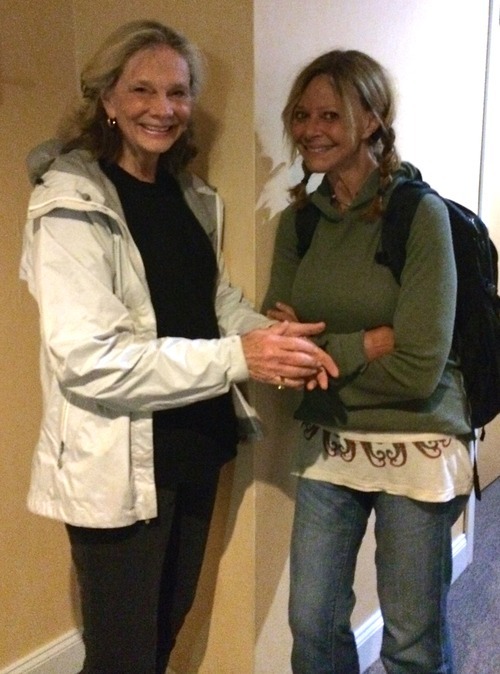
On Tuesday evening, August 12th, I had the privilege of introducing Joyce Maynard at the St. George Literary Series, sponsored by the Jackson Memorial Library in Tenants Harbor, Maine. The event was held at the Martinsville Grange to a capacity crowd of over 100 people.
By the time Joyce reached the end of her lively, spellbinding introductory talk, she had the audience poised in expectation for her reading. The passage she had carefully, yet seemingly spontaneously, set up, concerned her meeting with J.D. Salinger when she was 44 years old—25 years after she had spent 11 months living with him. At the time they were in Florida on spring vacation with his children. He handed her 50. and told her to leave immediately, to pack up her things and be gone from his house by the time he came home. For the next 7-9 minutes during her reading, you could hear a leaf drop. No one in that wonderful old building, sitting on uncomfortable metal chairs, moved a muscle.
Joyce Maynard tells her own story like a one-woman theatrical production. Anyone listening would want to read her books, and, with even a minimal desire to write, would want to attend her memoir classes. Besides her annual Guatemala classes during the winter, she comes to Maine every summer to give two one-week workshops at the Maine Media Center in Rockport.
She began her talk by saying, “We all come from somewhere—and spend the rest of our lives making sense of it.” Her memoir At Home in the World, her essays, and each of her novels, all 12 of them, are pieces of the puzzle of her life.
A few of the questions from the audience and Joyce’s answers deserve recording.
Question: Was your writing affected by Salinger and if so, how?
Answer: Not at all. He was not primarily a writing mentor. But, he did stress the importance of always telling the truth.
Question: What would you say was the major influence that helped you along the way?
Answer: Having a child.
Question: When you were writing about alcoholism in your family, were your parents still alive?
Answer: No. But we should not write to please anyone. Write as if you were an orphan. My parents taught me to write who I am—“to say what it is.” I think if you read my book, you will love my parents. Always write from a place of compassion.
Question: Do you write about your sister?
Answer: Yes. We are both writers. I couldn’t tell you her phone number, but I love her. We both write about the same events, but from radically different points of view.
Question: How do you know if you are ready to write a memoir?
Answer: I waited 25 years. Don’t write something you are in the middle of. Get some distance on it. Write when you understand your story. It is not necessarily what happened but what you understand about what happened that matters.
Question: Does writing get any easier with years of experience?
Answer: It shouldn’t. Writing is not easy. If it’s easy, it won’t be any good.
One of the last questions inquired if she had found a new love in her life. With a sparkle in her eye, she shared her experience of being single for 24 years and finding a wonderful man through Match.com. She married again in 2013. You can read about it in the August issue of Vogue.